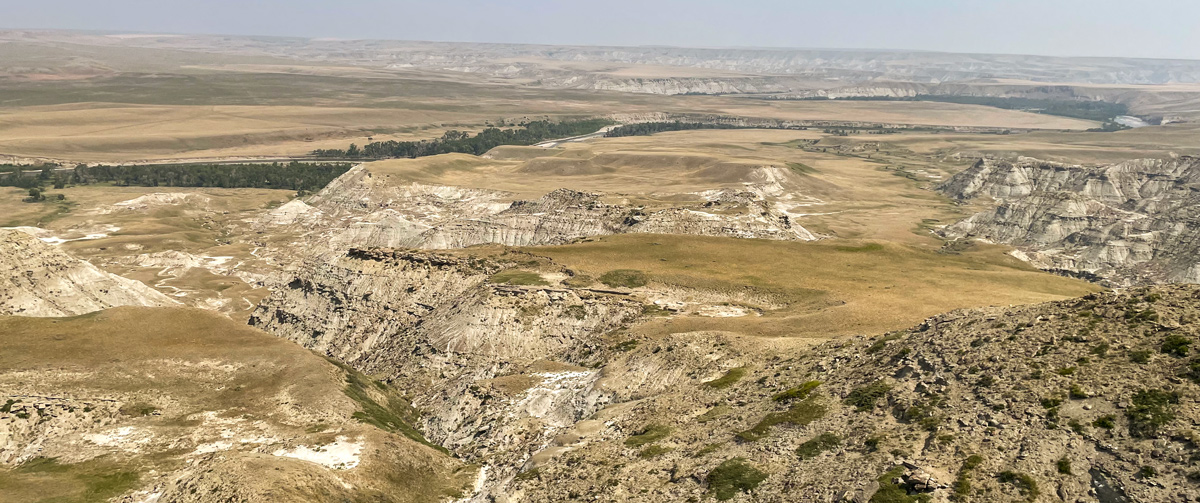On 26 July 1806, Lewis and his men left Camp Disappointment and headed for the mouth of the Marias River, where they planned to rendezvous with the rest of their contingent. After about seventeen miles, riding on the south (right) side of the Two Medicine River, Lewis spied eight young Indians “on the top of an eminence”—Flag Butte, the highest point on the ridge above the river in the photograph. The encounter was unwelcome, though not unexpected. Soon, however, Lewis concluded that the Indian boys “were more allarmed at this accedental interview” than he and his own men were. Lewis assumed they were the dreaded The Atsinas, “Minnetarees of Fort de Prarie,” but they probably were Piegan Blackfeet.
The Indians invited the Americans to share a campsite that night. The camp may have been in the vicinity of the wooded area on the far (east) side of the river, just left of center in the picture. Settling in for the night, the two parties smoked and talked, with sign-talker Drouillard as interpreter. Lewis told the Piegans of his expedition and its purposes, adding that an American post would soon be conveniently established in Blackfoot territory. To the youths, this meant that the Flathead Salish and other tribes unwelcome to the Blackfoot would come to trade on their turf. Not a good sign!
Possible campsite on the Two Medicine River
(view northwest from Flag Butte)
This may have been the site of the camp that Lewis, Joseph and Reubin Field, and George Drouillard shared with the eight Piegans on Saturday night, 26 July 1806.
At daybreak, despite the soldiers’ watchfulness, the Indians tried to steal the Americans’ guns and horses. That immediately erupted into a skirmish. Lewis and his men recovered the guns but killed at least one and possibly two of the Piegans in the process. The rest fled. Quickly, the four Corps members packed their gear, mounted up, and raced toward the Missouri River, covering more than a hundred miles in a little over twenty-four hours. The next morning, as they neared the river, they heard rifle fire in the distance, and as they neared the bank of the Missouri they “had the unspeakable satisfaction to see our canoes coming down” from White Bear Islands.
The two captains and their respective detachments, which at one point during the month of July had been 250 miles apart, were reunited on 12 August 1806 near today’s New Town, North Dakota. Hurrying on down the Missouri without further delays, they arrived in St. Louis on 23 September 1806. “The Corps of Volunteers for North Western Discovery” had fulfilled its mission.
Traditional Two Medicine Fight Site
© 2021 Kristopher K. Townsend. Permission to use granted under the Creative Commons Attribution-Share Alike 4.0 International license.
The rugged expanse of the Two Medicine River breaks hides more than one possible location for Lewis’s encounter with the Blackfeet. Above, an old interpretive sign at two cottonwood trees commemorates the event, seen at the extreme left. The property is on the Blackfeet Reservation and requires permission to visit.—Kristopher K. Townsend
From Discovering Lewis & Clark from the Air
Photography by Jim Wark
Text by Joseph Mussulman
Reproduced by permission of Mountain Press
Two Medicine Fight Site is a High Potential Historic Site along the Lewis and Clark National Historic Trail managed by the U.S. National Park Service. The site is on private property.—ed.
Experience the Lewis and Clark Trail
The Lewis and Clark Trail Experience—our sister site at lewisandclark.travel—connects the world to people and places on the Lewis and Clark Trail.
Discover More
- The Lewis and Clark Expedition: Day by Day by Gary E. Moulton (University of Nebraska Press, 2018). The story in prose, 14 May 1804–23 September 1806.
- The Lewis and Clark Journals: An American Epic of Discovery (abridged) by Gary E. Moulton (University of Nebraska Press, 2003). Selected journal excerpts, 14 May 1804–23 September 1806.
- The Lewis and Clark Journals. by Gary E. Moulton (University of Nebraska Press, 1983–2001). The complete story in 13 volumes.





